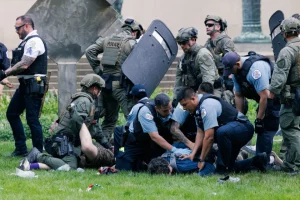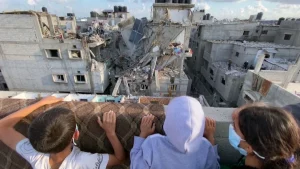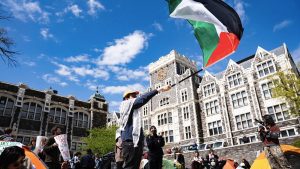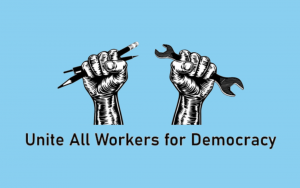It’s hard to believe that the encampment at the University of Michigan where students are protesting the university’s financial complicity in the ongoing genocide in Gaza is only two weeks old. Since establishing the encampment, the broad coalition, led mostly by graduate student organizers but supported by undergrads, faculty and staff, and community members, has grown tremendously. Over the last two weeks they have increased their actions, demanding the University divest from companies that profit from Israel’s occupation of Palestine and war on Gaza.
Over the last two weeks, camp activity has prioritized education and building community. Well over 100 permanent residents of the encampment have staged protests, teach-ins, and public engagement campaigns. They have drawn in donations from the community to establish a daily food supply for protestors and any community members who are hungry, free of charge. They have also established a small library, stocked with handouts, zines, and donated books ranging from Palestinian histories and poetry to contemporary anti-colonialist novels. Haymarket books shipped a box of books to the encampment to support its growth. They have even repaired long-broken pieces of brickwork, replacing them with pro-Palestinian artwork.
The encampment has also been the staging ground for demonstrations, calling on the University’s president and Board of Regents to meet and discuss divestment. The Regents, however, stand by their earlier position in March, when they voted against divestment, citing their primary goals “…to shield the endowment from political pressures and base investment decisions on financial factors such as risk and return.”
Although the University initially took a more hands-off approach to the camp, tensions have flared more recently. Over the weekend, protestors were attacked by police outside of the University of Michigan Museum of Art, where the Regents were attending an event. The next day, students took the demonstrations to their departmental graduation ceremonies, and to the main graduation ceremony, with some waving Palestinian flags in front of the President on their way to receive their diplomas.
Like other protest encampments across the country, the University of Michigan protests have, in many ways, become the story that the University and the local media has been focusing on, which has generated more discussion about the genocide in Gaza and financial culpability of American institutions. But an over-emphasis on these encampments and student protests might also run the risk of shifting attention away from Israel’s continued attacks on the people of Palestine. Luckily, the protestors at the University of Michigan encampment are acting as effective guides for keeping the focus on divestment as a tool to stop the deaths of so many Palestinians.
If you want to know about the protests, head out to the encampments!
In the two weeks since the encampment was established, I’ve spent some time at the encampment, thumbing through the library, watching and listening to meeting groups while they discuss strategy and goals, and talking to folks about the encampment and the genocide in Gaza. I’ve eaten some breakfast and drank some coffee, listening to members of the TAHRIR coalition (the largest group of activists in the encampment) reflect on their lessons so far.
One co-organizer (quotes are anonymized because of an aggressive doxing campaign by Zionist groups) noted that she had been involved in other organizing work but this encampment functioned differently from the beginning: “The difference from the 1st to the 2nd day was huge. We could come into the space and make it ours, which I just didn’t think of before. This isn’t we come and leave. That makes the whole experience different.”
Another co-organizer agreed: “This is different. There’s no sense of separation from the outside world. We’re living out a public moment. Before, if we were going to get together it would be on a Zoom link. Now it’s here. We’re all here.”
The encampment is totally open to the public. This allows for a wide range of activism, but it also puts the protestors at risk, particularly from Zionist counter-protestors who have approached the encampment from time to time, often taking pictures and videos of people in the encampment, but have so far avoided direct physical conflict, possibly because of the number of people participating in the protests and a general policy of not engaging with provocateurs. The increased presence of campus, city, state police, as well as private security contractors, adds a constant threat of violence, particularly as instances of police brutality on campuses across the country spread.
These dangers are driving folks at the encampment to see each other as even more important allies, as one graduate student put it, “Being here together, living together all the time is visceral. This isn’t an abstract solidarity.” Another co-organizer described this as one of her first lessons of the encampment: “I’ve really learned what it means to hold spaces together, about collective decision making, and a sense of safety, that we are all literally safe and that we feel safe with each other.” This mix of community building, collective democratic processes, and personal safety struck me as an especially important and potentially long-lasting benefit of these encampments.
But the people I talked to were careful not to fall into the traps laid by the mass media focus on the encampments. They continually brought the discussion back to Gaza and questions of divestment. One co-organizer reflected that this was one of the things she always felt challenged by, “It’s important to remember to avoid distractions. It’s sometimes hard to think about keeping this all running and the goals we have, to not get caught up in the minutia.”
Everyone I talked to constantly brought discussions back to ways to pressure their university to divest from investments in military and surveillance technology. Some of the protestors continue to conduct research from the encampent, adding to their already-impressive analysis, showing how approximately $6 billion of the University endowment is filtered to investments in genocide, spyware, and repression.
Because the encampment is located in such a publicly visible location, this research work is easy to share with the broader public. Activists have used the local notice boards to post links to their research work, as well as talking points pushing back against dismissive ideas about the war in Gaza just being “a Middle East conflict,” and reiterating that this is a genocide funded by dollars from the US government and universities like Michigan.
They have also used the public space to call out the University President and the Regents, asking for a meeting about divestment that has so far been flatly refused. This public presentation of TAHRIR’s research and the open call for dialogue on divestment keeps the demands driving the encampment visible in a way that makes it harder for the University and its media outlets to divert conversations away from Gaza.
It will be necessary to continue to keep our eyes on the encampments in the coming days, as police violence looms, but not to the exclusion of much greater violence happening in Gaza, as Israel prepares to escalate violence in the city of Rafah even further, a move that UNICEF has called “a catastrophe upon a catastrophe,” and UN representatives have predicted would end in a civilian massacre. It is important to keep focus on the fact that these two struggles – the genocide in Gaza and the campus protests against that genocide, which are facing increasingly repressive reactions of their own – are linked.
The bombs and bullets being used to kill Palestinians every day are paid for, largely, by money from the United States. It is clear that President Biden will not willingly take the necessary steps to end the slaughter of innocent people in Palestine. It is equally clear that Israel will not willingly stop their assault on Gaza. Demands for economic divestments – demands like those shouted from encampments across the country – are one of the best avenues for stopping the genocide in Palestine.










